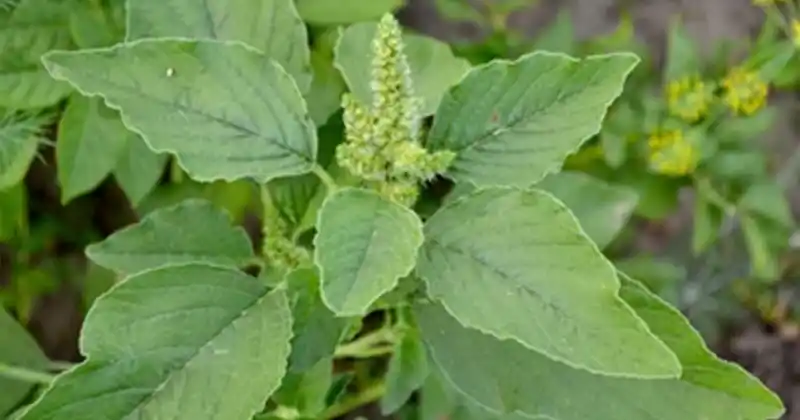Pigweed, often dismissed as a common garden nuisance, is actually a nutritional marvel with a wealth of health benefits. Belonging to the Amaranthus genus, pigweed is not just a weed but a plant with a rich history of use in various cultures for its medicinal and nutritional properties. Here’s a deep dive into the top ten health benefits of pigweed, how you can incorporate it into your diet, and important considerations for safe consumption.
Top 10 Health Benefits of Pigweed
1. Bone Health
- Benefit: Pigweed is a good source of calcium, which is essential for maintaining strong bones and preventing conditions like osteoporosis.
- How It Helps: The calcium content in pigweed supports bone density and overall skeletal health.
2. Heart Health
- Benefit: The fiber, antioxidants, and potassium in pigweed contribute to cardiovascular well-being.
- How It Helps: These components help lower blood pressure, reduce cholesterol levels, and support overall heart function.
3. Anemia Prevention
- Benefit: Pigweed is rich in iron, a crucial mineral for hemoglobin production.
- How It Helps: Adequate iron intake helps prevent iron-deficiency anemia and boosts energy levels.
4. Immune Support
- Benefit: High levels of vitamin C in pigweed enhance immune system function.
- How It Helps: Regular consumption can improve your body’s ability to fend off infections and illnesses.
5. Eye Health
- Benefit: Pigweed contains vitamin A and beta-carotene, essential for maintaining healthy vision.
- How It Helps: These nutrients help prevent eye conditions such as night blindness and support overall eye health.
6. Protein Source
- Benefit: The seeds of pigweed are a valuable source of plant-based protein.
- How It Helps: Rich in essential amino acids, pigweed seeds are an excellent addition to vegetarian and vegan diets.
7. Digestive Health
- Benefit: Pigweed is high in dietary fiber, which aids digestion and maintains a healthy gut.
- How It Helps: Fiber prevents constipation, regulates blood sugar levels, and supports heart health by reducing cholesterol.
8. Anti-inflammatory Effects
- Benefit: Pigweed has anti-inflammatory properties.
- How It Helps: It can help reduce inflammation in conditions like arthritis and other inflammatory diseases.
9. Antioxidant Properties
- Benefit: Pigweed is rich in antioxidants, including flavonoids and phenolic acids.
- How It Helps: These antioxidants protect the body against oxidative stress and reduce the risk of chronic diseases like heart disease and cancer.
10. High in Nutrients
- Benefit: Pigweed leaves are packed with essential vitamins and minerals, including vitamins A, C, K, calcium, iron, magnesium, and potassium.
- How It Helps: These nutrients are crucial for overall health and well-being, supporting various bodily functions.
How to Use Pigweed in Your Diet
Pigweed’s versatility makes it easy to incorporate into your meals. Here are some practical ways to add pigweed to your diet:
- Salads: Use young pigweed leaves as a nutritious addition to salads.
- Sautéed or Steamed: Cook pigweed leaves like spinach—sauté them with garlic and olive oil, or steam them for a healthy side dish.
- Soups and Stews: Add pigweed to soups and stews for an extra nutritional boost and a slightly earthy flavor.
- Smoothies: Blend pigweed leaves into smoothies for a nutrient-packed drink.
- Grains: Cook pigweed seeds like quinoa or use them in baking by grinding them into flour.
Essential Precautions
While pigweed offers numerous health benefits, it’s important to consume it wisely:
- Oxalic Acid: Some pigweed species contain oxalic acid, which can interfere with calcium absorption and may contribute to kidney stone formation. If you are prone to kidney stones or have concerns about calcium absorption, consult a healthcare provider.
- Identification and Contaminants: Ensure that the pigweed you consume is correctly identified and free from pesticides and other contaminants. It’s best to harvest from areas not treated with chemicals.
Conclusion
Pigweed is more than just an invasive weed—it’s a nutritional powerhouse that can enhance your diet and support your health. With its impressive array of vitamins, minerals, antioxidants, and protein, incorporating pigweed into your meals can contribute to overall well-being. By understanding its benefits and taking necessary precautions, you can make the most of this underappreciated plant and enjoy its health benefits in your culinary adventures. Embrace pigweed as a valuable addition to your diet and unlock its potential for improved health.
